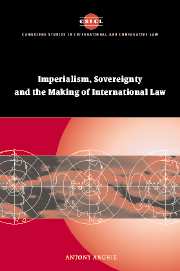Book contents
- Frontmatter
- Contents
- Foreword
- Acknowledgements
- Table of cases
- Table of treaties
- Introduction
- 1 Francisco de Vitoria and the colonial origins of international law
- 2 Finding the peripheries: colonialism in nineteenth-century international law
- 3 Colonialism and the birth of international institutions: the Mandate System of the League of Nations
- 4 Sovereignty and the post-colonial state
- 5 Governance and globalization, civilization and commerce
- 6 On making war on the terrorist: imperialism as self-defence
- Conclusion
- Bibliography
- Index
- CAMBRIDGE STUDIES IN INTERNATIONAL AND COMPARATIVE LAW
Introduction
Published online by Cambridge University Press: 05 August 2012
- Frontmatter
- Contents
- Foreword
- Acknowledgements
- Table of cases
- Table of treaties
- Introduction
- 1 Francisco de Vitoria and the colonial origins of international law
- 2 Finding the peripheries: colonialism in nineteenth-century international law
- 3 Colonialism and the birth of international institutions: the Mandate System of the League of Nations
- 4 Sovereignty and the post-colonial state
- 5 Governance and globalization, civilization and commerce
- 6 On making war on the terrorist: imperialism as self-defence
- Conclusion
- Bibliography
- Index
- CAMBRIDGE STUDIES IN INTERNATIONAL AND COMPARATIVE LAW
Summary
The empires of our time were short lived, but they have altered the world forever; their passing away is their least significant feature.
The colonizer constructs himself as he constructs the colony. The relationship is intimate, an open secret that cannot be part of official knowledge.
The themes and concerns that animate this book emerged from my experiences as a research assistant working for C. G. Weeramantry who was then Chief Commissioner of an Inquiry established by the Government of Nauru to examine the history of the phosphate mining that took place on the island. The League of Nations placed Nauru under a mandate and appointed three partner governments, Australia, New Zealand and the United Kingdom to be the mandatory powers. In effect, however, Nauru was administered by Australia, acting on behalf of the partner governments, first as a mandate territory under the League and then, as a trusteeship territory under the United Nations. Nauru was rich in phosphates and the Australian administration commenced mining the phosphates very shortly after assuming control over Nauru. The mining operations, which was very destructive to the territory, had been opposed by the people of Nauru, who asserted that they held the three partner governments responsible for the damage caused. Upon becoming an independent state, Nauru continued to maintain this claim, which was consistently denied by the partner governments.
- Type
- Chapter
- Information
- Publisher: Cambridge University PressPrint publication year: 2005

